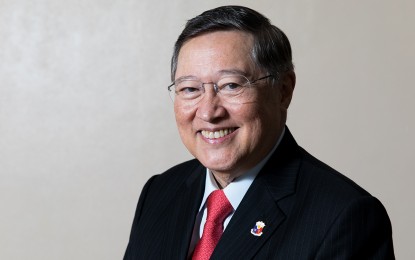
Finance Secretary Carlos Dominguez III
MANILA – Finance Secretary Carlos Dominguez III has maintained the Duterte administration’s position to anchor on fiscal prudence and sustainability any plans to stimulate the domestic economy amid the deepening coronavirus-induced global downturn, as state borrowings to beat the pandemic went up in the first four months of the year to PHP1.22 trillion.
Net of repayments to the government’s creditors and bondholders for existing loans, the government’s financing increased by an additional PHP873 billion from the end of 2019 to April 2020.
The latest report from the Bureau of the Treasury (BTr) revealed that around PHP982 billion, or 81 percent of the new borrowings, was sourced domestically through treasury bills and bonds and a PHP300-billion short-term loan from the Bangko Sentral ng Pilipinas (BSP).
The balance, amounting to around PHP237 billion or 19 percent of the total, was sourced externally through a mix of concessional foreign loans and bond issuances.
Dominguez said higher borrowings this year are crucial to letting the Duterte administration carry out a wide range of initiatives for the country to cope with the unexpected shocks unleashed by the coronavirus disease 2019 (Covid-19) pandemic and before that, the eruption of the Taal Volcano.
"The government has had to increase spending to implement its Four-Pillar Socioeconomic Strategy against Covid-19 even as strict mobility restrictions that national and local governments imposed since March to suppress the coronavirus’ spread had curtailed economic activity and led to a sizable drop in the state's revenue intake," he said.
Before the surge of Covid-19 community transmissions in the country, Dominguez said the Duterte administration also had to deal at the onset of 2020 with the eruption of the Taal Volcano, which caused temporary suspensions in production, particularly in the Cavite-Laguna-Batangas-Rizal-
“While the government is borrowing more than usual this year in order to fund healthcare, social protection, and other essential programs while our revenues are down, we have to be careful about spending too much above our means," Dominguez said.
He said as the country borrowed PHP1.22 trillion in just four months, “fiscal space should be saved to afford us elbow room” in case future circumstances require a new round of big healthcare spending, subsidies, and/or stimulus programs.
“Loans are not free money,” he added. “They are advances that we, or even our children and their children, will have to pay for in some way in the future. The Duterte administration’s policy is to be careful not to borrow beyond sustainable levels, lest we fall into a vicious cycle of accumulating unmanageable debt, which might drastically increase our financing costs, and plunge us deeper into debt."
"Hence, it is imperative that we limit state spending to a manageable and sustainable level equivalent to a 9-percent budget deficit.”
The economic team earlier reported that a target budget deficit of 9 percent, which takes into account the administration’s proposed stimulus measures, would place it at the median of the Philippines’ peer group.
This should hold whether the country is compared to countries in East Asia and the Pacific, to its Association of Southeast Asian Nations (Asean) neighbors, or countries with credit ratings in the "BBB" to "A-" range.
In a vote of confidence in President Duterte’s prudent fiscal management and his government's capability to steer the economy back to its high-growth trajectory, the Japan Credit Rating Agency (JCR) upgraded the country’s credit rating from "BBB+" to "A-" with a "stable" outlook last week.
The credit rating upgrade comes at a time when economies across the world are reeling from what could likely become the worst global downturn in nearly a century.
Dominguez earlier said JCR's "A-" rating upgrade was a solid recognition of the Philippines’ capability to stage a quick and strong recovery from the Covid-triggered global economic slump on the back of its Four-Pillar Strategy to beat the pandemic.
The government’s Four-Pillar Socioeconomic Strategy against Covid-19 is made up of emergency support for vulnerable groups and individuals; marshaling of resources to fight Covid-19; fiscal and monetary actions to finance emergency initiatives and keep the economy afloat; and an economic recovery program focused on getting businesses back on their feet to sustain and create jobs.
The strategy has a combined value of PHP1.74 trillion or 9.1 percent of gross domestic product (GDP). (PR)
